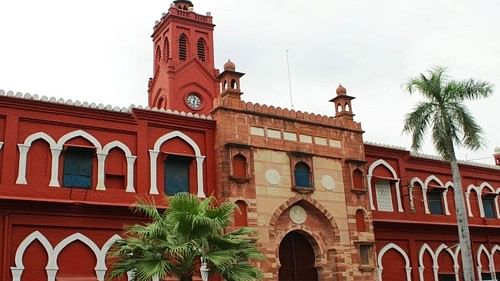
Aligarh Muslim University.
Credit: PTI Photo
New Delhi: The Supreme Court on Thursday said that over the last hundred years, Aligarh Muslim University (AMU) has continued to be an institute of national importance, without the minority tag and asked how it matters for the people whether it is a minority institution or not.
A seven-judge bench presided over by Chief Justice of India D Y Chandrachud and comprising Justices Sanjiv Khanna, Surya Kant, J B Pardiwala, Dipankar Datta, Manoj Misra and Satish Chandra Sharma, is hearing a matter related to minority status of AMU.
The bench asked advocate Shadan Farasat, appearing a petitioner, “Over the last hundred years without the minority institution tag, AMU has continued to be an institute of national importance. How does it matter that if we are not with you on Basha”.
In 1967, a five-judge constitution bench in the 'S Azeez Basha Vs Union of India' case in 1967 held that since the AMU was a central university, it cannot be considered a minority institution. The university got back its minority status when Parliament passed the AMU (Amendment) Act in 1981.
The bench asked the counsel how it would create great damage without the minority tag, institution (AMU) has continued to be an institute of national importance.
"How does it matter for the peple whether AMU is minority institution or not? It is only the brand name -- AMU," the bench said.
Farasat said “Until Basha, it was considered a minority institution, today, due to status quo order of this court on the 1981 amendment, it continues to be a minority institution. If the court upholds Basha, for the first time clearly now it will become a non-minority institution”.
He said women Muslim students are especially sent to AMU because of the minority status which are sociological facts.
The bench also asked him if there is any other minority university in India which is hundred per cent funded by the central government. The court was informed that Jamia Millia Islamia university in Delhi is substantially funded by the central government, and there may be others, but data is not available now.
During the daylong hearing on the third day, the bench also orally observed, “The object of Article 30 of the Constitution, is not, if we may use the expression do not take it otherwise, to ghettoise the minorities".
"If other people are associated in the administration, it does not detract from your character as a minority institution," the bench said.
Referring to the word "choice" used in Article 30 (1), the bench said that the minorities are given a choice to either administer the institute themselves or get it done by others.
"Article 30 does not mandate that the administration has to be by the minority itself. What Article 30 contemplates and recognises is the right, mainly the right of choice, the discretion given to minorities to administer in a manner which they deem appropriate," the bench said.
During the hearing, senior advocate Kapil Sibal for AMU Old Boys Association said that he was a part of the governing body of St Stephen's College in Delhi and most of the governing body members were non-minority people.
Sibal said that minorities may not possess expertise in dealing with all aspects and may have to involve others. He added in some technical areas the institution may not have knowledge, especially in medical college and then people from outside can come to help and they may be in majority, and “that doesn’t destroy the character of the institution”.
The court will continue to hear the matter on January 23.
A constitution bench is hearing pleas by AMU and others, where it will decide on the question whether an educational institution created by a parliamentary statute enjoys minority status under Article 30 of the Constitution.
